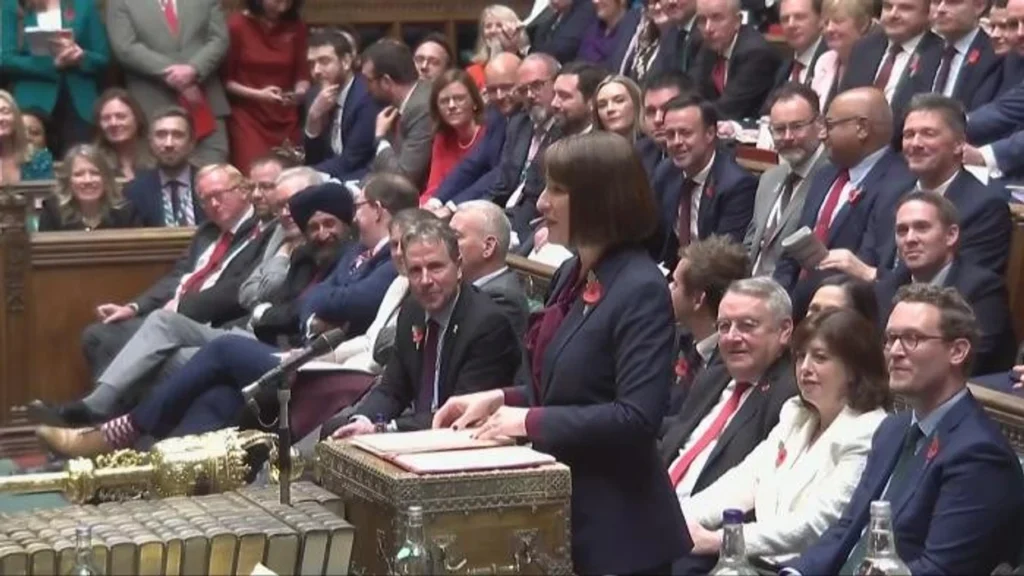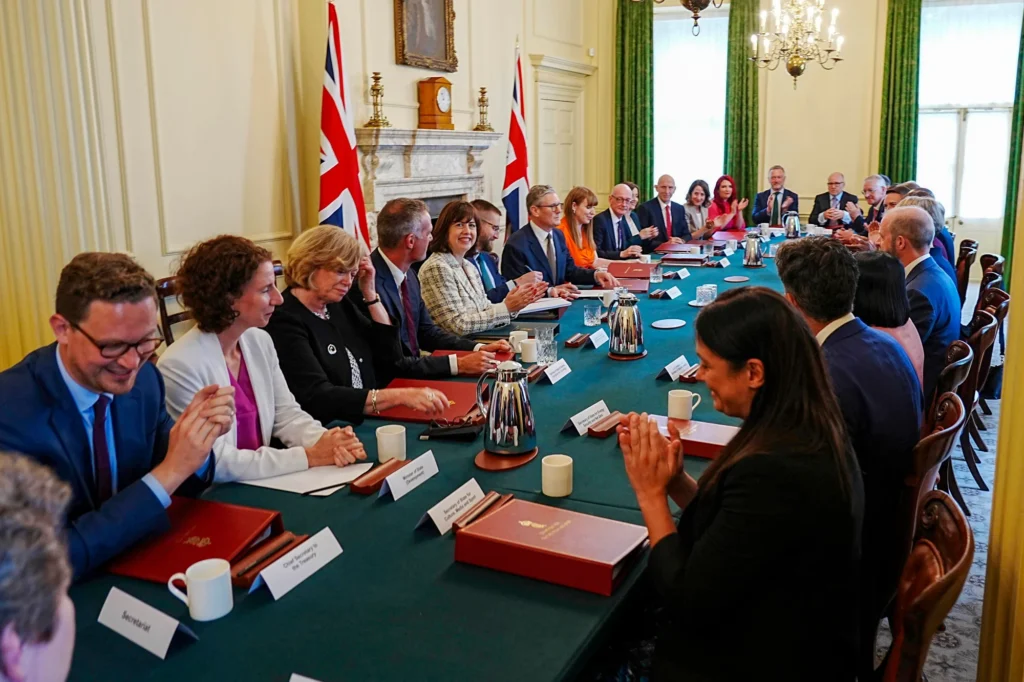Last Wednesday the Chancellor, Rachel Reeves, delivered her budget. Rachel Reeves is not only the first Labour Chancellor since 2010, but also the first woman to head the country’s finances. The budget raised borrowing £19.6bn, taxes by £36bn, and spending by £70bn in a departure from recent budgets under the previous government. While some have praised the budget for investing in key public services, others have raised concerns about the burden ordinary people may face to meet the government’s new tax demands.
This article provides The Level Head’s balanced perspective on the budget. We will discuss what effect the budget will have on ordinary working people. To be clear at the outset, ordinary working people means people who depend on a salary or wage they get from working a job, as opposed to living on rental income, dividends, interest, etc. Below we will discuss inflation, tax, climate policy, austerity, economic growth, and the financial markets.
The mainstream headlines have had little positive to say about Rachel Reeves’ first budget. At The Level Head we aim to provide a balanced view. The truth is that this budget is not all good news, but ultimately it provides a starting point from which this government can turn our economy round. Having seen difficult times in recent years, this budget is the first step towards fixing Britain’s economy.
Inflation: Are prices going to rise?
The first thing the government wants us to know is that it is going to spend our money. The government will increase capital spending to £131bn in 2025-26.[1] This means a substantive increase in the level of investment the government is putting into our public services. Most importantly, the government will spend £25bn on the NHS and £6.7bn in education.
The difference this investment will make in health and education should be noticeable for ordinary people over the coming year. This spending counterbalances the tax increases Reeves has brought in, meaning this is not an austerity budget. But there is a cost to this new spending.

Firstly, the OBR expects inflation to rise by 0.6% due to budget. Inflation fell to 2% (the current BoE inflation rate estimate is 1.7%) in March but is expected to rise to 2.6% by mid-2025.[2] The OBR expects the inflation rate to return to 2% by 2029-30.
Rising inflation means rising prices, which will affect the whole economy, especially working people. A return to higher living costs risks continuing the crisis that has tied a knot around household budgets for the last two years. This could be political damaging for a Labour government that has promised to act in the interests of ordinary working people. Rising inflation would also result in rising interest rates, which would harm growth.
The Bank of England’s Monetary Policy Committee (MPC) will decide whether to alter the base interest rate (currently 5%). New inflationary pressures caused by the budget may urge it to discontinue its trend of rate cutting. It is unlikely, however, to reverse the cuts it has made so far. Inflation rising to 2.6% is not significantly above the government’s target and is within the 1% margin for acceptable inflation.
Will you have to pay more tax? No…
There are many aspects of the budget that will specifically affect ordinary working people. The most important of these is that the government will not increase income tax, VAT, or employee national insurance contributions (NICs).[3] As has been widely pointed out, these are the biggest revenue sources for the government, making them a tempting option for a quick injection of cash.
The fact that the Labour government has abstained from these direct taxes on working people is a welcome relief for ordinary people. Increasing the tax burden on income, employee NICs, or VAT would have only reignited the cost-of-living crisis and dissolved any good will the electorate has for this government. At the same time, the government has increased the national living wage by 6.7%, putting £1,400 extra per year into as many as three million working people.
The government has increased the price cap on bus fares from £2 to £3.[4] This will be unwelcome to many across the country, especially living in areas that are both dependent on buses and struggling with below standard bus services. This will particularly affect the North East of England, where public transport is often substandard and starved of investment, though it will also be felt in many other areas of the country.
However, this is perhaps offset by the freeze in fuel duty. Though this continues an irritating trend in the politics of the budget, with successive budgets having provided a one-year extension to the fuel duty freeze, it is nevertheless and important saving for ordinary families. Scrapping the duty freeze – while at the same time making public transport more expensive and introducing a means test for the pensioners’ winter fuel allowance – would have been poor optics for a new Labour government.
What does the budget do about climate change?
It has been pointed out by the Green Party that subsidising fuel makes it harder for the government to meet its climate targets. However, this is offset by other measures in the budget.[5] The 50% rise in air passenger duty for private jets might act as a disincentive for unnecessary low-passenger flights. A perhaps more effective change is the increase in differentials in Vehicle Excise Duty for electric vehicles (EVs) and hybrids versus combustion engine cars. The first-year tax break on EVs and EV infrastructure has also been extended.
While this might not be the difference between causing and preventing a climate disaster, it might go some way to offsetting the continued dependence many ordinary people have on vehicles that harm the environment. With the additional disincentive to use public transport in the £1 increase in bus fares in mind, the budget breaks even when it comes to climate change.
Will there be a wealth tax?
A number of other important measures were introduced in the budget that might not affect most people, but are important. The lower rate of capital gains tax (CGT), which applies to money acquired from the sale of an asset, will rise from 10% to 18% while the higher rate will increase from 20% to 24%. Special arrangements for capital gains for businesses and other investors will also rise. In total, the CGT changes will raise £2.5bn by 2029-30.[6] This will not fundamentally affect the future of the United Kingdom, but it is not a trivial revenue raiser either. Most people in the UK do not receive capital gains and therefore will not pay CGT.
The fact that cuts will be made to some extent in some departments cannot be called a return to austerity.
Something that has been a major source of consternation in the press has been the introduction of VAT on independent schools (the official term for private schools). The standard rate of 20% VAT will be levied on private school fees,[7] which will raise £1.7bn by the end of the decade.[8] The right-leaning press has stressed the effect this will have on middle-earners who have worked hard to send their children to private school.
Those on the left of British politics point out that one of the major barriers to equality in modern British society is whether someone has been to public or private school. Paying for a better education stands against the principle of equality of opportunity and means those with deeper pockets have a privileged access to better university and better jobs. This inefficiency in the education system is likely harmful to the UK’s international competitiveness as the biggest differentiator of educational outcome is the wealth of a person’s family rather than their own merit.
Who foots the bill?
Economists predict that the cost of a rise in employer NICs will be passed on to consumers in the medium term. Businesses are likely to increase prices, reduce hiring numbers, or implement pay freezes in order as a result of this additional cost. Ultimately, this may cause a degree of inflationary pressure as consumers pay the price for higher business costs, one way or another.
However, the allowance for small businesses has been doubled and is now £10,500.[9] The government claims this means 865,000 businesses will pay no NICs at all in 2026. Reports have tended to stress the impact the employer NICs rise will have on small businesses. In reality it is medium sized businesses that will be the most proportionately affected. The smallest business, those employing no more than four staff, will not be affected.
Crucially, this means many small start-ups will be afforded breathing space in their early years of operation when their staff numbers are small. What must also be pointed out is that in nominal terms most of the revenue raised by the NICs increase will be paid by large businesses and corporations.

The budget can seem like a jumble of information. Among the chaos are some of the most important decisions the government makes.
The OBR analysis of the budget does not show a fundamental change in employment and unemployment compared to its March forecasts.[10] The unemployment rate is expected to fall from 4.3% this year to 4.0% by 2026. This is due to the temporary boost in demand caused by the budget. Only in 2028 is unemployment expected to rise to 4.1% when this demand boost has worn off.
Employment, on the other hand, will consistently increase by 200,000 a year as the population grows. Employment is expected to be at around 60% from now until the end of the decade, 1.5% lower than pre-pandemic levels. Ultimately, the OBR unemployment and employment forecasts are not radically different from their March forecasts despite the rise in employer NICs.
This measure will not hit ordinary consumers as hard as a rise in income tax or VAT. It is true that, in the medium to long run, ordinary people will pay some of the cost for this employer NICs increase. But of the options available to the Chancellor, using employer NICs as a revenue boost spreads the cost to the ordinary consumer over a longer period of time than an immediate hike in VAT or income tax.
The fact that it only indirectly affects ordinary people also allows for businesses to pay some of the cost themselves, especially in the short term before they make changes in response to the budget. It is also likely to be more effective than straightforward increases in corporation tax, which would likely be avoided or evaded by the biggest businesses and, if not, passed on to the consumer.
Unprotected Departments: Are ‘efficiency’ savings veiled austerity?
In their Fixing the Foundations statement released in July,[11] the government promised to implement a 2% ‘efficiency’ savings target that would apply across departments. This has now been formally announced in the budget,[12] along with other measures such as ‘more regular’ spending reviews and the creation of the Office for Value for Money.[13] The Institute for Fiscal Studies (IFS) has suggested that this could amount to real-term cuts of 1.4% to ‘unprotected’ government departments.[14] Some commentators have raised concerns that this marks a return to austerity through the back door.
Which departments are protected and which are not is a complicated issue. There is no clear statement in the government documentation about which departments are most likely to face spending cuts. The OBR budget analysis does not refer to unprotected departments, but unprotected spending. For their purposes, unprotected spending is spending implied by existing spending targets and commitments but is not specifically outlined in the budget.[15]
This budget is not a resounding victory for ordinary working people, but it is an investment in our future. With strong foundations, the UK can meet the challenges of the coming years.
In some cases, it is obvious that a department will not be in for real-term cuts in the near future. The IFS indicate that NHS England, childcare entitlements, defence, and the Foreign Office will see real-term spending growth between now and 2029.[16] In addition, the OBR says that core schools spending and official development assistance will ‘flatline’ in real-terms.[17] Everything else, then, is fair game.
Reducing expenditure by government departments on external consultants, communications, and marketing were specifically mentioned in the Fixing the Foundations statement.[18] These obvious excesses are unlikely to meet objection by the electorate. However, they are likely an attempt at misdirection to disguise more substantive cuts that will affect the real work of lower status departments. Nevertheless, the reality that cuts will be made to some extent in some departments cannot be called a return to austerity. At least, not when it is accompanied by the raft of new spending commitments also included in the budget.
Is the economy going to grow?
Mainstream papers report that the OBR has downgraded growth projections from 1.7%, forecast in March this year, to 1.5%. But this only part of the picture presented by the OBR data. According to their October economic report,[19] the OBR estimates GDP growth will be around 1.1% this year, rising from almost 0% in 2023. GDP growth is forecast as high as 2% in 2025 and 1.8% in 2026. Growth is then predicted to dwindle to a consistent rate of 1.5% each year from 2027 to 2029.
While the growth figures are not exactly off the charts, they are better than recent years. The UK is a developed economy that has been battered by the 2008 financial crash, the austerity that followed, Brexit, COVID, and the cost-of-living crisis. We are not in a situation where more than 2% growth is realistic in the short term. It should not be forgotten that only a year ago the economy had entered into a recession, albeit a shallow one.
The decisions contained in the budget will shape this Labour government’s time in office.

The growth projections for this and the next two years are good. Not excellent, not great, but good. It is only in the last couple of years of the 2020s that growth slows down to an undesirably low level. However, by the time the annual growth rate has slumped to 1.5% the Chancellor will have delivered two, possibly three, more budgets. This first budget lays the groundwork for further spending in later years. It is likely that further spending is planned for subsequent budgets.
What does the Chancellor need for sustained annual growth of close to 2% from 2027 onwards? Strong revenues, growth targets in the next two years to be met, and global events remain more stable than they have been in the last eight years. Sounds like a tall order, but it’s a better plan than austerity.
Market Reaction: What do investors think?
On Friday the markets steadied after a flurry of bearish activity on Thursday. The FTSE100 and 250 showed signs of improvement, rallying by 0.83% and 0.45% respectively. The pound was up against most major currencies. GPB was up 0.28% up on the USD, 0.68% on the Euro, and 0.32% on the Chinese Renminbi. Unease about the outcome of the impending US election might be some of the reason why investors are keen to put their money in non-US indices, including the FTSE. Nevertheless, today’s uptick suggests that investors are not worryingly bearish about the UK economy.
The steadying was also felt in the gilts market. Gilts are bonds sold by the UK government. Gilt yields are the interest paid on government bond, shown as a proportion of the bond’s current market value. When the value of gilts rises, gilt yields fall. Gilt yields continued their rise on Friday morning, having risen to 4.48% on ten-year bonds. However, by market close yields had fallen to 4.39%.
Yields have been a major topic of discussion this week as the right-wing papers have stoked pessimism about the budget. While the rise in gilt yields was not what the government would have hoped for this week, the rally in the markets on Friday suggests that investor sentiment is more positive than it initially seemed. Although only time will tell, Friday’s activity is promising. Combined with the government’s recent business summit, the uptick in the markets at the end of the week suggests Britain is once again showing appeal to investors.
What does it all mean?
So, what does this budget mean for ordinary working people? This is, of course, a complicated question. Ultimately, the budget is a mixed bag when it comes to day-to-day life. The inflationary pressures likely to result from this budget are minor compared to those we have felt in recent years. Nevertheless, even a minor rise in prices can be hard on those on a tight household budget, especially with Christmas and cold nights adding additional costs.
The fuel duty freeze might help for those with cars, but the rise in bus fares will not help those who rely on public transport. However, spending on health and education, two big priorities for voters, should help to turn things around in our public services. Public services are not going to be fixed over night, but this budget makes a start.
With any luck, this budget is the first tentative step towards a better Britain.
What about the more abstract aspects of the budget, like economic growth and the financial markets? How will these things affect ordinary working people?
The growth numbers for the next two years are reasonably positive at 2% or thereabouts. Growth means more tax revenue for the government (which means more government spending), more jobs, and more money flowing through the economy. If Rachel Reeves’ tax and growth targets are met in the next one to two years, noticeable changes for the better.
A country needs public and private sector investment to thrive. If the commitments promised at the government’s recent business summit come off, and if Friday’s market rally indicates confidence in Britain’s economy, more money should come into the economy. Only time will tell.
Final Thoughts
The UK has been put under quite a few pressures in recent years, whether due to the 2008 crisis, Brexit, COVID, or the cost-of-living crisis. With the US election round the corner, the markets are going to be very busy very soon. This will make it difficult to assess the short-term effect of the budget on investor sentiment and, depending on the outcome, could have a radical effect on the world economy. This means that factors beyond Rachel Reeves’ or Keir Starmer’s control might affect Britain’s economic performance.
IFS welcomes the long-term intentions the budget has, breaking with the short-termism of recent budgets under the Conservatives. This is an important fact of this budget. This budget is not a resounding victory for ordinary working people, but it is an investment in our future. With strong foundations, the UK can meet the challenges of the coming years.
For the first time for a long time, Britain’s public services will receive a big cash investment. This will lay the foundations for further spending and investment in future budgets. This budget is what Britain needs now, nothing more. In that sense, it is something we have not had for quite some time. With any luck, this budget is the first tentative step towards a better Britain.
[1] HM Treasury, Autumn Budget 2024: Fixing the Foundations to Deliver Change, (HH Associates on behalf of HM Stationery Office: London, 2024), p.2.
[2] Office for Budget Responsibility (OBR), Economic and Fiscal Outlook (EFO): October 2024, (HM Stationery Office: London, 2024), p.9.
[3] Treasury, Budget, p.2.
[4] Treasury, Budget, p.96.
[5] Treasury, Budget, p.4.
[6] OBR, EFO, p.56.
[7] Treasury, Budget, p.129.
[8] OBR, EFO, p.7.
[9] Treasury, Budget, p.4.
[10] OBR, EFO, p.41.
[11] HM Treasury, Fixing the Foundations: Public Spending Audit 2024-25, (HH Associates on behalf of HM Stationery Office: London, 2024), p.10.
[12] Treasury, Budget,p.40.
[13] Treasury, Budget, p.2.
[14] Bee Boileau, ‘Public Spending: A Parliament of Two Halves?’, Institute for Fiscal Studies, (31 October 2024), <https://ifs.org.uk/collections/autumn-budget-2024>.
[15] OBR, EFO, p.122.
[16] Boileau, ‘Public Spending’, <https://ifs.org.uk>.
[17] OBR, EFO, p.122.
[18] Treasury, Fixing the Foundations, p.10.
[19] OBR, EFO, p.8.




I am regular reader, how are you everybody? This piece of writing
posted at this web site is truly pleasant.
Here is my webpage ascii code for blank space
Rachel Reeves’ first budget as Chancellor marks a significant shift in economic policy, focusing on increased spending in health and education. While the investment is commendable, the accompanying tax rises may place additional pressure on working families already struggling with rising living costs. The budget aims to address long-standing economic challenges, but its success will depend on how effectively it balances growth and inflation.